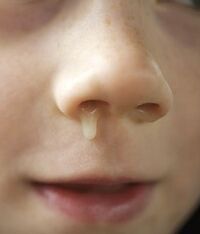Runny nose
A runny nose can be described as a condition where the nasal cavity is filled with a significant amount of mucous fluid, otherwise known as "snot". This occurs relatively frequently within healthy human beings and is a common symptom of allergies or certain diseases, such as the common cold or hay fever. It can also be a side effect of crying and exposure to cold temperatures.
A runny nose is often accompanied by other coinciding effects such as excessive yawning, increased salivation, increased phlegm production, and watery eyes. It is most commonly induced under the influence of heavy dosages of tryptamine psychedelic compounds, such as psilocybin, 4-AcO-DMT, and 4-HO-MET. However, it can also occur under the influence of opioid withdrawals[1]) and as a symptom of cocaine abuse.[2]
Psychoactive substances
Compounds within our psychoactive substance index which may cause this effect include:
Experience reports
Annectdotal reports which describe this effect with our experience index include:
See also
External links
References
- ↑ Kneisl, C. R., Trigoboff, E. (2004). Contemporary psychiatric-mental health nursing (1st ed.). Pearson. ISBN 9780132557771.
- ↑ Myon, L., Delforge, A., Raoul, G., Ferri, J. (February 2010). "[Palatal necrosis due to cocaine abuse]". Revue De Stomatologie Et De Chirurgie Maxillo-Faciale. 111 (1): 32–35. doi:10.1016/j.stomax.2009.01.009. ISSN 1776-257X.
